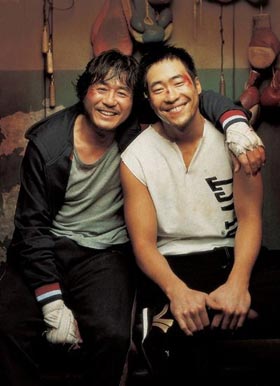| |
|
review | availability | |

Choi Min-Sik and Ryoo Seung-Bum
Availability:
DVD (Korea)
Region 3 NTSC
EnterOne DVD
2-Disc DTS Limited Edition
16x9 Anamorphic Widescreen
Korean Language Track
Dolby Digital 5.1, DTS 5.1
Removable English and Korean Subtitles
Making Of Featurettes, Interviews, Trailer,
Music Video

|
|
|
Review by
Calvin
McMillin: |
The traditional
underdog boxing story gets a Korean facelift
in Ryoo Seung-Wan’s Crying Fist, a genre-busting
box office smash about two men from different
walks of life searching for a little redemption.
Rather than focus on one boxer alone, the film
explores two different fighters, both of whom
are undergoing troubling upheavals in their
personal lives.
Ryoo Seung-Bum
(from Arahan and No Manners) plays
Yu Sang-Hwan, an angry teenage punk with a penchant
for crime. His out-of-control antics result
in constant brushes with the law, a pattern
of behavior that eventually lands him in prison.
His hot temper sparks a number of jailhouse
fights, paving the way for his acceptance into
the prison’s boxing program. While Sang-Hwan
reluctantly steps into the ring to vent his
frustrations, he soon finds that it may be his
ticket out of his delinquent lifestyle.
Choi Min-Sik (Old
Boy), plays Kang Tae-Shik, the other half
of the film’s boxing duo. Unlike the wayward
youth Sang-Hwan, Tae-Shik is an older man going
through a mid-life crisis of the most serious
kind. Having once won the silver medal for boxing,
Tae-Shik is now up to his ears in debt with
creditors and various shady criminal types.
With his family disintegrating and his money
situation dire, Tae-Shik is forced to earn cash
on the streets, utilizing his boxing skills
in a most unconventional way. Rather than dish
out punishment, Tae-Shik is forced to take it,
offering himself up as a punching bag for any
passerby who’s willing to pay the required fee.
Crying Fist cuts back and forth between the two characters,
as they both struggle to take back a measure
of control in their lives. The film does a fantastic
job of integrating the performances of Ryoo
Seung-Bum and Choi Min-Sik into one powerful
whole. Each storyline is worthy of its own movie,
but director Ryoo Seung-Wan rightfully combines
the two in order to avert formulaic notions
associated with these kind of films.
Most boxing movies
focus on a singular individual, an underdog
who trains hard for the big fight. Even the
most pedestrian boxing film will still be able
to earn a hefty measure of sympathy and loyalty
from its audience in favor of the film’s protagonist.
Crying Fist, however, succeeds in aligning
the viewers with both of its protagonists, a
circumstance which causes a peculiar kind of
“problem” once the finale kicks in. If we as
the audience recognize that each man desperately
needs this win, who do we cheer for in the final
bout?
With our divided loyalties, we can only
watch as the film’s gripping resolution plays
out, with no clue as to what will happen or
what we hope will happen to our two characters.
At the end of the day, it may “only be a movie,”
but Crying Fist is a gritty, powerful
film that captures your attention from the very
first frame and throws you headlong into its
double plot. Although who wins in the climactic
bout is revealed by story’s end, the real winner
of Crying Fist is most definitely the
audience. (Calvin McMillin, 2005)
|
|